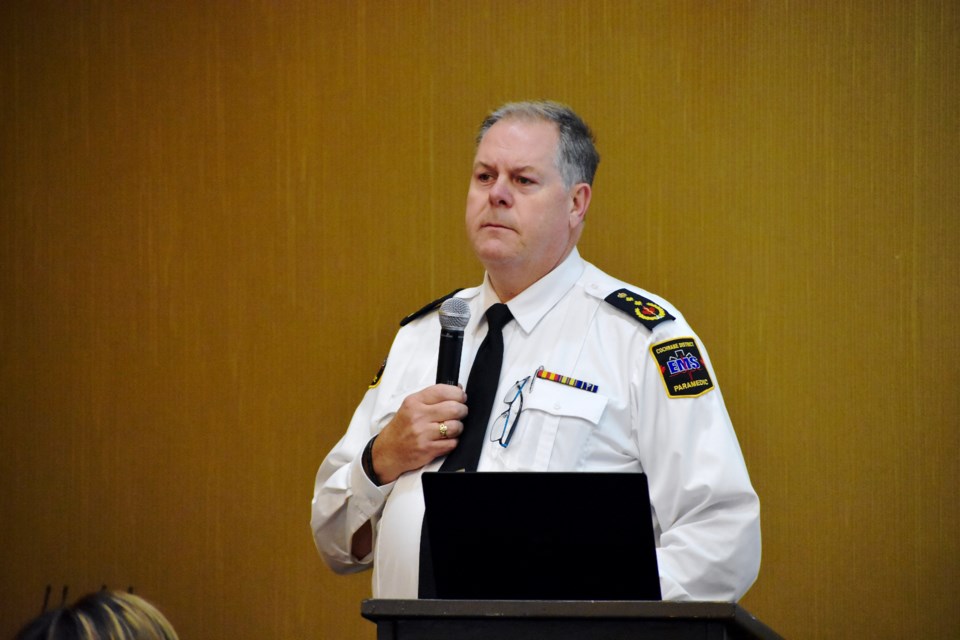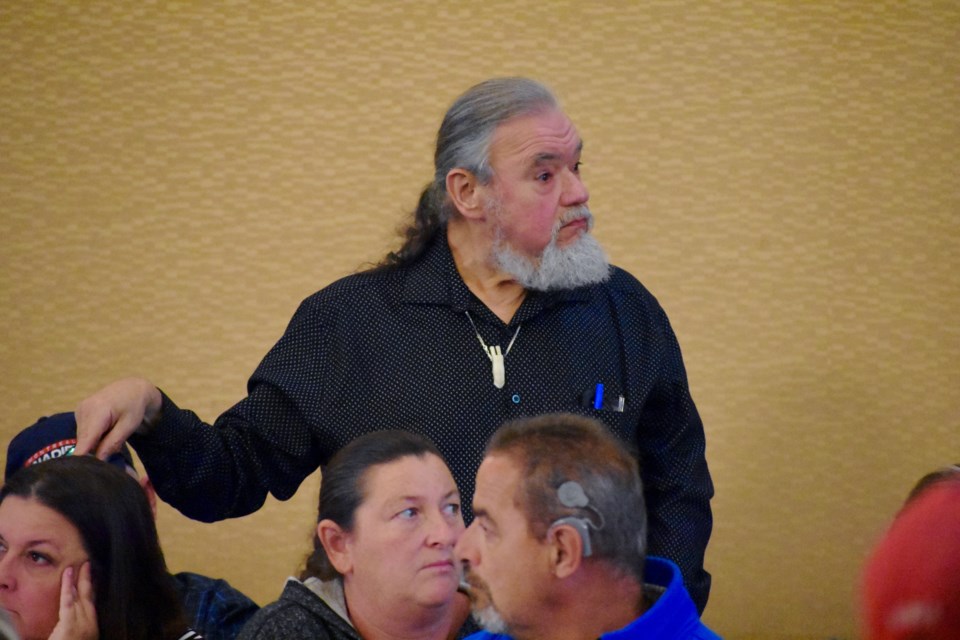TIMMINS - The first chance for residents to hear about a proposed wellness centre, turned into a heated meeting and led to the councillor for the area stepping down from the services board.
Monday, Cochrane District Services Board (CDSB) held a public meeting to talk about the proposal to turn the Ramada Inn at 1800 Riverside Dr. into the Timmins and Area Wellness Centre of Excellence (WCE) - Health Hub.
The goal is to create a centralized service hub offering mental health and addiction treatment services and transitional housing support.
Held in the ballroom at the Ramada, the room quickly filled to capacity before it started and people were lined up into the parking lot.

The deputy chief of paramedic services, Seamus Murphy, kicked off the meeting, sharing his connection to the drug crisis as his niece died over two years ago.
“It was her struggles in life that made me change my ideas of the way I thought about people who use drugs. I thought people chose to do drugs. They don’t,” he said.
As he continued talking about programs the CDSB has implemented, such as being the first Ontario paramedics to distribute Naloxone and the first in Canada to offer suboxone, a medication used to treat addictions with opiates, he was interrupted by people in the audience.

One man asked if CDSB knew there were people waiting in the hallway and outside to get into the room, which was met with applause.
At one point, when the door opened, a woman could be heard passionately talking in the hallway.
“You don’t have to listen to their agenda, that’s their agenda. Our agenda is to have people here," she told people.
Some of the people in the hall waiting were Ward 1 residents, who Coun. Rock Whissell said should have had the opportunity to be in the room and learn about the facility.
The meeting was described in the agenda as a "café-style engagement session". Key organizations partnering in the project were at a round table, with the aim being for people to visit different representatives and have one-on-one conversations.
With so many people in attendance, not everybody had that opportunity.
By the end of the night, Whissell made a tough choice.
“Five months ago I made decision to support this establishment and the way the (CDSB) were going to operate this facility,” he said, fighting back tears.
“They had made a promise to be open, to be transparent and everybody would get a chance to know what this was about. And after tonight, that is not what happened. I’m resigning from (CDSB)."
By sitting at the CDSB table and being privy to confidential conversations, Whissell has felt conflicted when constituents ask questions about the proposal. By removing one of the hats he was wearing, he said it's an opportunity to represent his ward.
“I have no choice, I have to say something publicly because I’ve gotten so much abuse. I have been representing Mountjoy for so long, and I want to represent Mountjoy as much as I can. And this was not representing Mountjoy by allowing (CDSB) not to give people in Mountjoy the answers that they’re looking or. I’m hoping that there’s going to be something bigger, and I will make sure we organize something bigger to be able to share all this information," he said.
Whissell is still the Ward 1 councillor. He still supports the wellness centre and the concept.
“My role now is to make sure the people that live in Ward 1 are recognized and I won’t be in conflict of interest because I won’t be on that board. The information that I receive, I will be able to share with everybody in Ward 1. I’m changing hats,” he said.
What is a wellness centre
The Timmins and Area Wellness Centre of Excellence (WCE) - Health Hub was publicly announced last week.
SEE: CDSB buying Timmins hotel for proposed wellness centre
The CDSB is in talks to buy the Ramada Inn in Timmins' west end with the intent of creating a service hub. It would not be an emergency shelter, offer harm reduction supplies or be a safe consumption site.
At Monday's meeting, CDSB director of health Jean Carriere talked about what the facility could offer.
CDSB is buying the building and developing it.
The organization would also have a footprint at the site to offer social services and support to get people back into the community, he said.
The vision is to have withdrawal management (detox beds), mental health therapy and supports, and supportive housing.
It means someone in withdrawal management can go into a supportive bed or withdrawal management program under one roof.
“And from there we’re just not ready to kick you out on the street, we’re going to provide you supportive housing on site, with day therapy, with responsibilities and with some education while you’re here so that we can prepare you to get back out into the regular world,” he said.
People willing to check in for treatment would be referred from the hospital, Canadian Mental Health Association, family health team, paramedics or another partner agency.
“There’s no come and go, it’s not like somebody could show up at a door or line up at a door. This is really very much a residential facility,” he said.
The hotel operates with over 100 beds. The centre would need office space and treatment rooms, and he estimates 90-100 beds could be offered under the model.
It's still too early to know what renovations are needed, he said.
"We are in the consultation stage with our partner agencies to see what they need and what their requirements are and then we’ll go from there,” he said.
Last month, Ontario announced the creation of 19 Homelessness and Addiction Recovery Treatment (HART) hubs in Ontario.
The CDSB is applying for the wellness centre to operate as a HART hub.
Applications close in October and facilities will know if they're approved in November. The goal is to open the hubs in early 2025.
An advantage to Timmins application, said Carriere, is having the hotel because there is no money for capital expenses in the application.
“Because of all the agencies, the way we pay for the building is through rent and operations. If one of our agencies has 10 rooms and are providing treatment in those 10 rooms then they would pay rent for their 10 rooms as part of their funding as part of their funding from the province, which comes back to pay for the building. Either way, it’s all tax dollars. There’s only one taxpayer, we recognize that, but this is something that the community, the district, the region really needs,” he said.
Staffing is a challenge for many organizations.
It's not known how many staff would be needed, but CDSB sees an advantage in putting multiple services under one roof.
“All of us in healthcare are facing HR issues, we’re having a hard time recruiting, there’s not a lot of healthcare workers out there. But putting us all under one roof gives us an opportunity to share staff, to share responsibilities, and to make sure we can provide better service to our clients,” he said.
Getting informed
Sylvie Laporte stopped by the information session and talked to CDSB CAO Brian Marks.
She lives on Spruce Street and wanted to learn more about the project because of that.
“Where we’re at it’s not good. We see homeless, we see drug addicts daily. We see them overdose,” she said.
Laporte says she wants to see people get help.
"It’s just where is it going to go. We don’t want another … Living Space and having people living in tents — it’s not right to live that way. And there is a shortage of housing and it’s a real reality. So where are these people going to go? If they have nowhere to go, if they don’t finish this treatment — where are they going?” she said.
Carriere hopes that the wellness centre means fewer people at the emergency shelter.
“Some of the reasons that some people are homeless are mental health and addictions and that they don’t have opportunity to get into treatment. Or they have the opportunity and they want to send them out of town and they don’t want to do that. If we could do that locally, what we’re hoping is they will come into the facility, they’ll get treatment, they’ll get trained in life skills and they will be able to get back out into the community,” he said.
